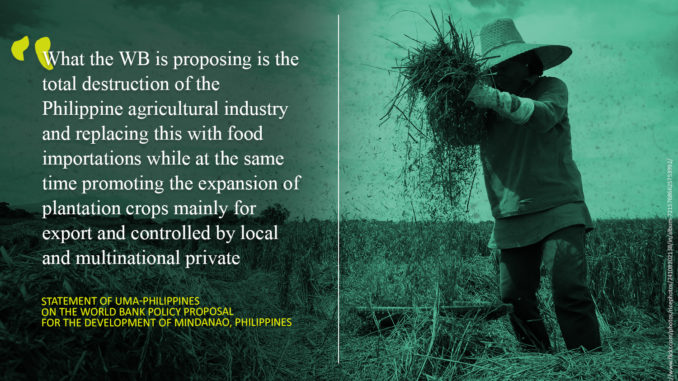
The Unyon ng mga Manggagawa sa Agrikultura (UMA) stated today that the World Banks Policy Paper entitled “Philippines Mindanao Jobs Report: A Strategy for Mindanao Regional Development” which was published in June 2017 but only recently publicized would doom the country’s food sovereignty.
According to John Milton Lozande, secretary general of the Unyon ng mga Manggagawa sa Agrikultura (UMA), the World Bank is advocating rice importation instead of the country being rice self-sufficient. This includes removing import barriers to agricultural goods especially for the private sector, including rice and reducing the National Food Authority (NFA) to just concentrating on building up stocks to buffer emergencies and on disaster mitigation programs.
Among the agricultural products whose tariffs should be removed and which the WB is advocating to the Philippine government other than rice are corn, sugar, poultry, pork, and flour. The WB justifies this by stating that this would ensure greater food security for the poor.
Other than these, the WB is also advocating for the continuation of the collection of irrigation service fees from farmers even if there is already a law on free irrigation for smallholders.
It then advocates smallholders to shift to high-value crops, connect to markets and agribusinesses and enter into agriculture venture agreements (AVA) with agribusiness firms. In other words, let their lands be controlled by landlords, local and multinational corporations and turn their lands into plantations of bananas, pineapples, oil palm, and others. This can be through lease or growership agreements which are the most common forms of AVA.
Essentially what the WB is proposing is the total destruction of the Philippine agricultural industry and replacing this with food importations while at the same time promoting the expansion of plantation crops mainly for export and controlled by local and multinational private entities.
It is no wonder that the Duterte government is follwing most of the World Bank’s proposals. It is bent on importing more rice, reducing the NFA’s mandate while increasing private control on the rice industry and is bent on expanding 1.6 million hectares more of plantations, especially in Mindanao.
The Philippine government should sign and implement instead the Comprehensive Agreement on Socio-Economic Reforms (CASER) with the National Democratic Front of the Philippines (NDFP) in the coming peace talks to ensure food sovereignty and security and together with national industrialization eradicate poverty and improve the economic lives of the Filipino people. ###

Leave a Reply